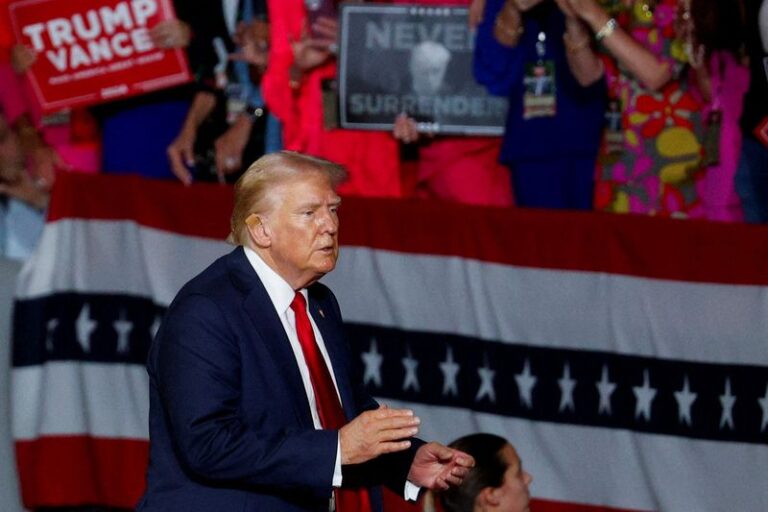By Christoph Steitz and Greta Rosen-Fondern
FRANKFURT/GDANSK (Reuters) – European companies focused on clean energy are abandoning expansion plans, bracing for falling sales and questioning funding for U.S. projects due to concerns about how Donald Trump’s election victory would affect the industry.
Trump has dismissed President Joe Biden’s climate change efforts as a “new environmental scam” and is expected to try to reverse many of the administration’s efforts, including the Inflation Control Act (IRA), which provides tax breaks and subsidies to U.S. and foreign companies that invest in sustainable energy.
The law, passed in 2022, has acted as a strong incentive for European companies in the sector to expand or establish a presence in the US, but the fear of President Trump’s reelection has given them pause.
“Donald Trump is A) very opportunistic, B) very contentious and C) quite unpredictable, so you have to ask yourself whether it makes sense to make this kind of bet,” Peter Rosner, CEO of Luxembourg-based hydrogen company H2Apex, told Reuters.
Under the IRA, the company could have built a hydrogen tank production plant in the United States for about a third of the $15 million cost. But Rosner decided to halt the plan in February, fearing President Trump’s reelection, even though the company was already in early talks with potential customers.
Market bets that Trump will retake the White House in November have intensified this month after he was shot at a campaign rally and won the Republican nomination just days afterward.
Recent polls have shown a narrowing gap in support between Trump and front-runner Kamala Harris, who holds similar views on climate change to Biden. But Rosner’s comments reflect anxiety among European clean tech companies about what a Trump presidency would mean and how they are trying to prepare for such a scenario.
Energy data and analytics company Wood Mackenzie estimates that a projected $1 trillion in low-carbon energy investment by 2050 is at risk.
Consultancy Roland Berger said a complete repeal of the IRA was unlikely, but the Trump administration could still undermine incentives for electric vehicles, EV charging, solar power and energy efficiency.
German solar power company SMA Solar issued a profit warning last month, citing a possible change of government in the United States, the world’s second-largest solar power market after China, as one of the risks.
The world’s largest maker of solar inverters had initially targeted choosing a U.S. site for the factory by the end of June, but said it has not found one and is still evaluating potential locations in several states.
“A boardroom headache”
SMA has not abandoned its expansion plans for now, but the company told Reuters on July 4 that “there is currently a certain reluctance to invest in domestic renewable energy due to the uncertainty surrounding the outcome of the U.S. presidential election.”
That hesitancy is reflected in the performance of clean technology stocks, with the RENIXX index, which tracks the top 30 renewable energy companies in the world, underperforming global stock markets since the assassination attempt.
Orsted, the world’s largest offshore wind developer, has been particularly hard hit since President Donald Trump said he would target the sector on his first day in office if re-elected in May. Orsted declined to comment.
Some renewable energy companies seem undeterred by the uncertainty.
For example, German wind turbine maker Nordex said last month it would restart production at a mothballed factory in Iowa, saying the U.S. remained an important and large enough market for the company “regardless of the political situation.”
But several other companies have reported delays as prospective partners expected to co-finance the projects have postponed commitments.
Hydrogen company ThyssenKrupp Nucera spoke of delays in final investment decisions on U.S. projects, which led it to downgrade its outlook for its alkaline water electrolysis division earlier this year.
The firm said that while it remains focused on the U.S., it will be important to see what happens to its IRA program after the election. Strategic investors with a long-term focus on the cleantech sector are likely to restart projects sooner than more opportunistic investors amid ongoing uncertainty, it said.
Norwegian rival Nel said it had not yet made a final investment decision on a proposed production facility in Michigan, saying it would depend on demand for its products in the U.S. market.
Uncertainty over the outcome of the US election and its impact is beginning to impact industries outside of the cleantech sector. For example, German machinery manufacturer Trump earlier this month announced a 12% drop in US sales for the 2023/24 financial year, blaming “geopolitical uncertainty” for making industrial customers cautious.
Marcus Berret, global managing director at Roland Berger, said the increasing complexity that companies have to deal with on a global scale could lead to “analysis paralysis” when making investment decisions.
“As a result, there has been a lot more headaches at the board level.”
(1 dollar = 0.9220 euros)
(Reporting by Christoph Steitz and Greta Rosen-Vondern; Additional reporting by Jacob Gronholt Pedersen; Editing by Elaine Hardcastle and Tomasz Janowski)

